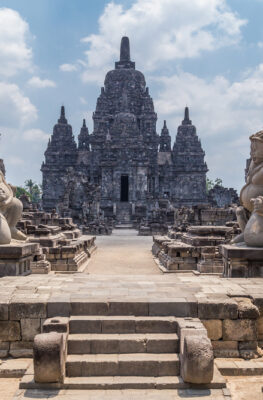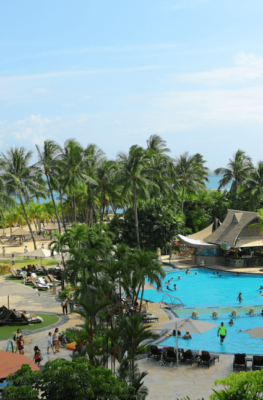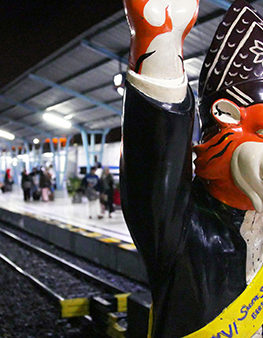Published on August 14, 2014
Since its official opening in April 2014 by Deputy Minister for Tourism and Creative Economy, Sapta Nirwandar, the Busan Indonesia Center (BIC) Building in Busan, South Korea has steadily increased its role in promoting Indonesia’s tourismt attractions in South Korea.
The Busan Indonesia Center is a five storey multi-function building covering a total area of 400 square meters, situated among shopping centers, restaurants, public park, and schools. This special building is also strategically located at one of Busan’s main streets which takes its name from one of Indonesia’s main cities, theSurabaya Street.
The Busan Indonesia Center serves diverse functions. Within the building are the office of VITO Korea (Indonesia’s Tourism Representative), the office of PKPU (Indonesia’s Organization for Human Rights), the BIC Office, an Art Function Room, the Office of Garuda Indonesia Airlines, and the Office of BNP2TKI (Indonesia’s Overseas Workers Representative). On the 4th floor is also an auditorium that is frequently used for many Indonesian events.
There is also a distinct Indonesian coffee shop featuring the legendary Indonesian civet coffee, the Kopi Luwak (luwak is Indonesian for Civet). Here visitors can feel the true Indonesian atmosphere through its typical Indonesian decor and authentic handicrafts displayed. The café presents Indonesian cuisine, there are Indonesian popular songs, and one can even watch Indonesian television channels.
In a meeting held at the Office of the Ministry of Tourism and Creative Economy at the Sapta Pesona Building in Jakarta on 7th August 2014, Director General for Tourism Marketing, Esti Reko Astuty together with the Head of the Busan Indonesia Center, Prof. Kim Soo-Il signed a Memorandum of Understanding on cooperation to promote Indonesian tourism in South Korea.
To indonesia.travel, Kim Soo-Il who is professor at the Busan University for Foreign Studies explained that many people believed that BIC is owned by the Indonesian Government since it provides all information on Indonesia, from tourism, culture, economy , to politics. The building is even frequently used for events of the Indonesian workers in Busan.
The existence of the Busan Indonesia Center in Busan plays a most important role in boosting the promotion of Indonesia’s tourism in South Korea. This is also in line with the goal of the Ministry of Tourism and Creative Economy to reach 9.6 million international tourist arrivals in 2014. According to the Central Bureau of Statistics (BPS), the 11 provinces in Indonesia most frequently visited by South Korean tourists are : Bali, West Java, Central Java, East Java, Jakarta, North Sumatra, Lampung, South Sulawesi, South Sumatra, Banten, and West Sumatra.
Busan itself is the second largest city in South Korea after the capital city, Seoul, and is regarded as the 3rd busiest port in the world. With the population reaching to 4 million people, the city is a potential market for Indonesian tourism. According to Prof.Kim, the majority of Korean expatriates in Indonesia are from Busan.
Kim Soo-il a very “Indonesia” Professor
His interest in Indonesia led Prof. Kim to study the Bahasa Indonesia language since 1972; and after visiting some of the most fascinating places in the archipelago, the professor’s fondness for Indonesia increased greatly. For the people around him, the professor is known as very “Indonesian”. He served as an honorary Consul for Indonesia in Busan from 1993 to 2007, while his letter of assignment at the time (1993) was directly signed by Soeharto, President of Indonesia at the time, Prof. Kim, who also served as South Korea’s Ambassador for East Timor, now serves as counselor to various Indonesia’s government bodies.
His love for Indonesia at times earned him criticism and comments such as “Why bother taking care of Indonesia?” However, to Professor Kim there exists a similar spirit between Indonesia and South Korea as countries who liberated themselves from foreign occupation with inadequate infrastructure. This same spirit of building a country independently is what drove the interest of Professor Kim
The establishment of the Busan Indonesia Center is also a form of Prof.Kim’s concern for Indonesian overseas workers in Busan. At the moment, there are at least 15 thousand Indonesian workers in Korea, and Prof.Kim wants them to have a representative “home” where they can communicate with one another or seek counseling from other Indonesians.
The Busan Indonesia Center is established through private funding. For the construction of the building, Prof Kim spent approximately USD6 million and at the moment, almost 80% of the building’s operational cost is paid by prof. Kim himself. Nevertheless, Prof. Kim stated that he does not expect anything from the Indonesian government except for the full commitment from the Indonesian government and communities to make optimal use of the building for the benefit of better Indonesia-Korea relationship.
Kim Soo-Il is in the business of rattan furniture from Indonesia and admitted that he has booked more than a decent profit from it. That is also the reason why the establishment of BIC Prof.Kim regards as returning the favor to Indonesia.






